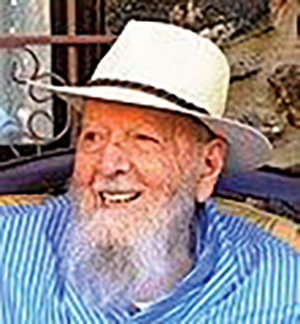
Herman Wouk passed on May 17, of this year, just a few days before his 104th birthday. A Pulitzer Prize winner (“The Caine Mutiny,” 1951) and prolific author, Wouk endured great criticism of his work throughout his career, including a good deal from his fellow Jews. Yet he never let this deter him from writing. As he gained public acclaim, some of his work was unabashedly more religious in theme and in characterization. Jewish characters figured front and center in all his work, a number of which were made into plays and movies (“The Caine Mutiny,” “Marjorie Morningstar”) and two TV miniseries (“The Winds of War” and “War and Remembrance”).
Nevertheless, Wouk was a Jew who went beyond wearing his religion proudly on his sleeve. It was integral to his personal life and ethos and catalyzed his significant venture into the non-fiction genre with “This is My God” (1959), a primer of sorts for Jews curious about their heritage. The book was dedicated to his grandfather, a rabbi and teacher who emigrated from Belarus and was responsible for Wouk’s Jewish education.
By the time “This is My God” was released, Wouk had already written four novels and three plays. He went on to pen many more works, the last being his memoir “Sailor and Fiddler,” written for his 100th birthday. “This is My God” had an influence on many, including this author. Diane Medved, psychologist and writer, succinctly captured Wouk’s uniqueness. “Herman Wouk flipped the image of traditional observance, demonstrating that one could be sophisticated and achieving in the larger world without compromising one’s faith.”
There is a short video of Wouk together with the Lubavitcher Rebbe at a farbrengen (gathering) in Brooklyn in 1975. In it, Wouk discussed in Yiddish with the Rebbe that “This is My God” had been recently translated into Hebrew and an inexpensive edition had been published for distribution to the Israeli army. The Rebbe commented that the translation was indicative of a thirst in Israel to know more about Judaism, that the book had made an impact and that although the book had already been published in the U.S., Wouk should not forget about American Jews.
The commitment to Orthodox Judaism wasn’t always so clear cut for Wouk. There was a period after graduation from Columbia University when Wouk, then a gag writer for Fred Allen’s radio show, retreated from Orthodoxy. Wouk’s father had said to him that if he were on his deathbed, and could only say one more thing, it would have been, “Study the Talmud.” At that time, Wouk may not have fully appreciated the advice, but later he felt a sense of loss without the Torah learning and rituals, and so he returned to his observance.
After Pearl Harbor, he enlisted in the Navy, where he met his future wife, Sarah. He married her after her conversion to Judaism, and the marriage lasted 66 years until her death in 2011. She was his muse, his mascot and, eventually, his literary agent. They had three boys, the eldest of which, Abe, drowned in a swimming pool accident at age 5. The foundation established in Abe’s memory published “This is My God” and profits from its sales have gone to education and charity.
Wouk had a self-described “main task,” which even after winning a Pulitzer Prize for “The Caine Mutiny,” he felt compelled to complete. In a “CBS This Morning” interview, when he was 102, he said “The main task was, so far as I could fix down in literature, what happened in WWII and in the Holocaust.” This he did, in two bestselling novels, “The Winds of War” and “War and Remembrance,” both of which were made into successful TV miniseries.
During his lifetime, Wouk wore many other hats—including teaching English to rabbinical students at Yeshiva University (where he had taken courses as a young man). He helped them make their sermons more accessible to their audiences. In addition to the Abe Wouk Foundation, he was involved in other charitable organizations, and also served on the board of a day school near his home in Palm Springs, California, and on the boards of various educational and charitable organizations. Even as a centenarian, he participated in Daf Yomi (daily learning of a portion of Talmud).
In September, 1955, Time published its cover story on Wouk (“The Wouk Mutiny”). “He is a devout Orthodox Jew who had achieved worldly success in worldly-wise Manhattan while adhering to dietary prohibitions and traditional rituals which many of his fellow Jews find embarrassing,” More power to you, Mr. Wouk. May your memory be for a blessing.
By Rachel S. Kovacs
Rachel S. Kovacs is an adjunct associate professor at CUNY. She can be reached at [email protected]










